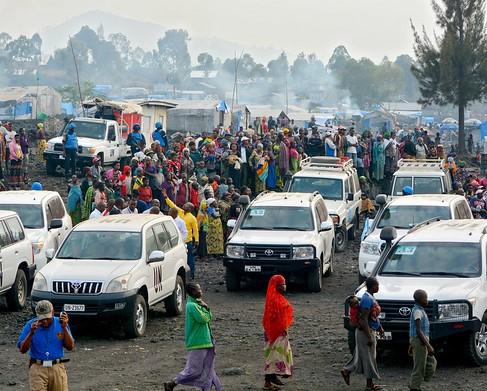As the Democratic Republic of the Congo (DRC) approaches a year of active Ebola transmission in North Kivu and Ituri provinces and case counts climb each day, renewed violence in the region has led to a sharp increase in displaced persons, according to the International Organization for Migration (IOM).
"Humanitarian actors urgently need access to provide assistance and prevent further massive displacement. We are increasingly concerned that rising displacement creates fertile ground for the spread of disease—most worryingly Ebola—in Ituri province," said Fabien Sambussy, IOM chief of mission in the DRC.
The displacement stems from political violence in the region, which the IOM said had been mostly controlled for the past 16 years. In recent weeks, 160 people have been killed in conflicts, and an estimated 400,000 persons are currently displaced throughout Ituri province.
Thousands of internally displaced Congolese are housed in a makeshift camp close to Bunia, which has seen recent Ebola transmission.
Within the past month, the outbreak has seen its first cases cross international borders, with two cases confirmed in Uganda. Over the weekend the Ugandan ministry of health said it is no longer following case contacts and declared their country Ebola-free after 21 days of no new cases.
Case counts reach 2,418
According to the World Health Organization's (WHO) online Ebola dashboard, the DRC will likely confirm 10 new cases of Ebola today, raising the outbreak total to 2,418.
In the past 3 days, the ministry of health has recorded 29 new cases. On Jul 6 DRC officials confirmed 9 cases, and yesterday they added 10 to the outbreak total. Since Jul 5 the health ministry has confirmed 19 new Ebola deaths.
As of yesterday, there were 1,625 deaths and 323 suspected cases under investigation. A total of 154,037 people have been vaccinated as part of a ring vaccination campaign.
Scientist questions vaccine stockpile
Late last week one of the scientists who helped develop Merck's rVSV-ZEBOV vaccine said there was not currently enough vaccine stockpiled to successfully stop this outbreak.
In an interview with the Canadian Broadcast Company (CDC), microbiologist Gary Kobinger, PhD, said the stockpile of the vaccine needs to reach 1 million doses, and halting the virus would require about 72% of the population to be immunized.
Merck commented it will expand the stockpile to 850,000 doses within 18 months. Since 2016, the WHO and Merck have maintained a stockpile of 300,000 doses.
See also:
Jul 5 IOM press release
Jul 6 Ugandan Ministry of Health statement
WHO Ebola dashboard
Jul 7 DRC update
Jul 6 DRC update
Jul 5 DRC update
Jul 6 CBC story

















